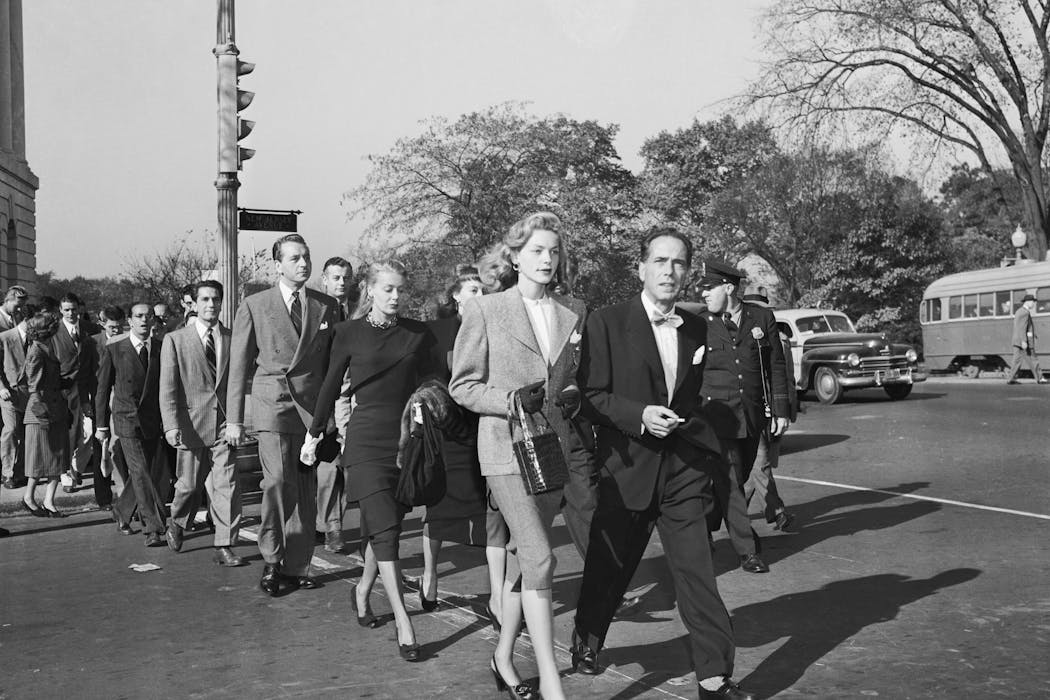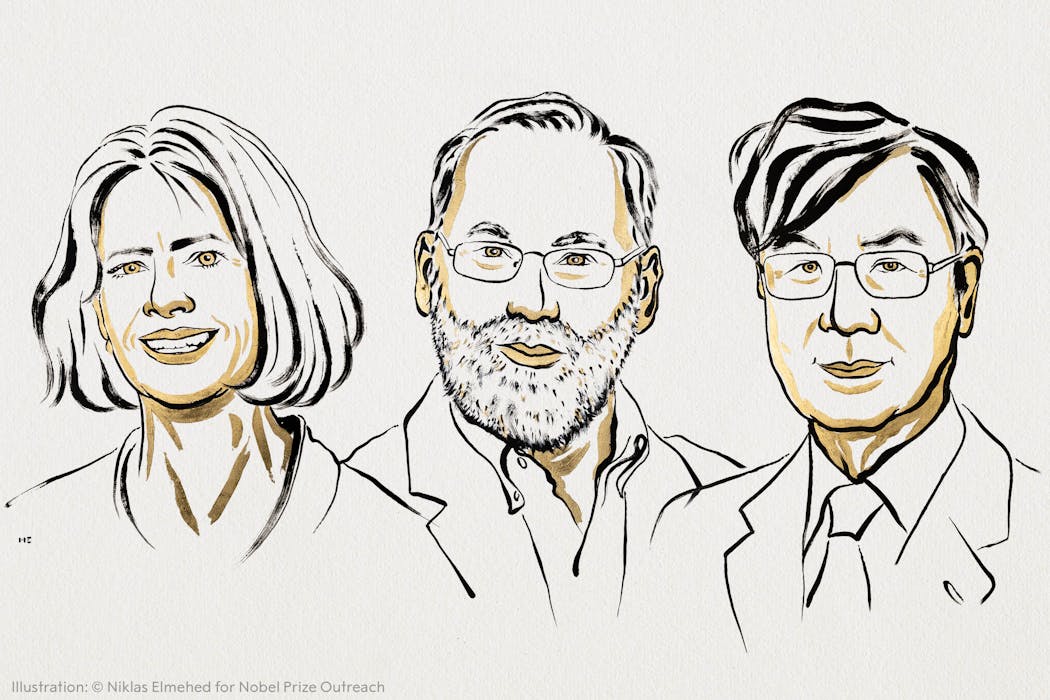Jane Fonda, other stars, revive the Committee for the First Amendment – a group that emerged when the anti-communist panic came for Hollywood
- Written by Kathy M. Newman, Associate Professor of English, Carnegie Mellon University, Carnegie Mellon University

Jane Fonda is joining forces with more than 500 celebrities and Hollywood heavyweights to defend free speech[1].
The membership roll already includes scores of famous actors[2] like Jamie Lee Curtis, Viola Davis, Whoopi Goldberg, Pedro Pascal, Natalie Portman and Michael Keaton. Successful directors like Spike Lee and Ben Stiller have signed on, along with singer and actress Barbra Streisand and pop star and songwriter Billie Eilish.
Fonda, a star who has championed progressive causes since the 1970s[3], explained when she announced the group’s new edition on Oct. 1, 2025, that the effort isn’t really new. Instead, it marks the relaunch of the Committee for the First Amendment[4], an organization her father, actor Henry Fonda[5], had belonged to.
The original Committee for the First Amendment was formed in October 1947 at a time when the U.S. government worried that there were communists in Hollywood who were putting left-wing propaganda into the movies.
Hearings divided Hollywood
The attack on Hollywood started when a bipartisan congressional committee held a series of highly publicized hearings in 1947 on what it said was the “communist infiltration of the motion picture industry.”
The House Un-American Activities Committee[7], known as HUAC, invited 23 “friendly” anti-communist witnesses[8] to testify.
Ayn Rand[9], a Russian-born novelist and screenwriter who hated communism, was one of the witnesses. She testified that the 1944 MGM movie “Song of Russia[10]” showed clean, well-dressed, happy peasants, which she said was a sanitized, propagandized version of life in the USSR.
Another movie that came under suspicion was “It’s a Wonderful Life.” The FBI complained that the 1946 blockbuster[11], which starred Jimmy Stewart as a broken man who learns the true value of his life, “deliberately maligned the upper classes” with its negative portrayal of Mr. Potter, the town’s richest man.
The HUAC hearings continued for a decade and divided Hollywood. The committee’s interrogators demanded that people turn on each other[12] and “name names.” Due to these hearings, as well as an anti-communist publication called Red Channels[13], hundreds of screenwriters, directors, producers, actors and musicians were fired or blacklisted[14] for having ties to liberal groups.
Fighting back
The HUAC hearings brought Hollywood stars and the flashbulbs of the nation’s press corps to Capitol Hill. Conservative screen idols like Gary Cooper[16] testified that communism wasn’t “on the level.”
Friendly witnesses[17], like Rand and Cooper, were allowed to read prepared statements and to speak for as long as they liked. Such courtesies were not granted to the 10 “unfriendly” witnesses – the suspected communists who became known as the “Hollywood 10[18].”
Screenwriter John Howard Lawson[19] was the first of the Hollywood 10 to testify. Lawson, after refusing to answer if he was a communist or not, was shouted down by Rep. J. Parnell Thomas[20], a New Jersey Republican who served as HUAC chair. After Lawson was removed from the courtroom, HUAC’s chief investigator, Robert Stripling, read detailed evidence[21] of Lawson’s communist affiliations.
Prominent Hollywood liberals understood that these hearings were an attack on free speech, free assembly and other rights guaranteed by the First Amendment[22].
Ira Gershwin[23], the lyricist known for his hit show tunes such as “I Got Rhythm” and “They Can’t Take That Away From Me,” hosted the first gathering of the Committee for the First Amendment at his Beverly Hills mansion. Attendees included Judy Garland, Humphrey Bogart, Lauren Bacall and Gene Kelly.
The committee quickly raised US$13,000 – the equivalent of $188,000 today – and chartered an airplane to Washington. Upon their arrival in the capital, they marched and spoke out[24] in support of the Hollywood 10. Next, they produced a radio broadcast, “Hollywood Fights Back[25],” as a defense of the rights of Americans to write, produce, act in and see whatever movies they pleased.
The committee released an initial statement with 35 signatories[26]. A few months later, it published a pamphlet with more than 300 additional names supporting the effort.
Purging Hollywood
If you’ve never heard of that committee, or if you only learned about it recently when the new version made headlines, you’re not alone. The group fizzled out almost as quickly as it had mobilized.
Bogart, perhaps its most famous member, soon retracted his support for the Hollywood 10, saying in March 1948 that he regretted his trip to Washington.
“I’m no Communist[27],” the “Casablanca[28]” star declared in a widely circulated statement.
Two crucial developments kneecapped the committee. First, the HUAC cited the Hollywood 10 for contempt of Congress[29]. They were later tried in court and convicted of that crime. They eventually served prison time.
Also, studio executives drafted new hiring policies for the movie industry. Later known as the “Waldorf declaration[30]” because the meeting took place in the Waldorf-Astoria hotel in Manhattan, the studio heads announced that the Hollywood 10 would be fired and banned from any studio, and that all the studios would agree to fire and ban any known communists.
Over the next decade, hundreds more stars and other key players in the entertainment industry were fired, purged and blacklisted[31] in what became known as the blacklist era.
I’m a professor of English and film studies[32], and I’m writing a book about progressive films made during those years[33]. The original committee’s members were mainly leftists and liberals whose careers survived the political pressures to root them out of show business.
The Committee for the First Amendment ultimately failed to protect the Hollywood 10 from professional attacks or incarceration, nor did it prevent hundreds of others from being blacklisted.
Bad timing
But I don’t believe that the original Committee for the First Amendment was destined to fail.
The Hollywood 10’s legal strategy, rooted in the First Amendment, reflected the hope that their convictions might be eventually overturned by the Supreme Court.
Unluckily, however, Frank Murphy[34] and Wiley Blount Rutledge[35], two of the court’s most liberal justices, died before the appeal of the first two Hollywood 10 convictions[36] could reach them.
After President Harry Truman replaced them, the Supreme Court[37] declined to hear the appeals. Most of the Hollywood 10 served prison sentences between 1950 and 1951.
Why bother?
Given that the Committee for the First Amendment failed to protect Hollywood from conservative repression in the 1940s and 1950s, why would anyone revive it?
One reason is that there are parallels between the blacklist era and today.
For example, the Trump administration is trying to get comedians who poke fun at him kicked off the air, as evidenced by talk show host Jimmy Kimmel[38] being temporarily pulled off the air.
Hollywood has also seen a surge in labor organizing. Many members of the new Committee for the First Amendment were on the front lines of the screenwriters and actors strikes of 2023[39].
Finally, this fight is arguably worth waging. Most Americans see the First Amendment as enshrining valuable rights. An October 2025 Marist poll found that 4 in 5 Americans[40] think the U.S. is restricting First Amendment freedoms too much.
Americans still debate whether or not it was right to fire and blacklist Hollywood’s suspected communists. While many see the HUAC hearings as a travesty[41], others defend the House committee[42] and the anti-communist fervor that inspired it.
‘The Pajama Game,’ a hit movie made in the 1950s, featured a fight by workers for higher pay.Resilience and silence
Many look at the blacklist era as a time of capitulation by progressives in the face of repression. While there’s some validity to these claims, I’ve found that many progressive filmmakers also banded together, using allegory and other creative techniques to make movies with progressive – sometimes radical – messages.
Take “The Pajama Game,” for example. It’s a musical comedy about labor trouble in a pajama factory. While the film is a sexy, frothy romp, on the one hand, the film also casts Doris Day as Babe, a feisty union steward. In “Racing with the Clock,” workers sing about the pressure they feel to speed up the pace of their labor.
Scenes include workers organizing a slowdown, sabotaging machinery and going on strike. The last word spoken in the film is “solidarity.”
To me, the revival of the Committee for the First Amendment draws attention to the dangers implicit in efforts to muzzle writers, artists and filmmakers.
“Silence the artist, and you silence the most articulate voice the people have,” the actress Katharine Hepburn[43] said in May 1947 in a speech written for her by Dalton Trumbo[44], one of the Hollywood 10. “Destroy culture and you destroy one of the strongest sources of inspiration from which a people can draw strength to fight for a better life.”
References
- ^ to defend free speech (apnews.com)
- ^ already includes scores of famous actors (www.npr.org)
- ^ since the 1970s (www.penguinrandomhouse.com)
- ^ Committee for the First Amendment (www.committeeforthefirstamendment.com)
- ^ actor Henry Fonda (www.imdb.com)
- ^ Kevin Winter/Getty Images (www.gettyimages.com)
- ^ House Un-American Activities Committee (www.trumanlibrary.gov)
- ^ invited 23 “friendly” anti-communist witnesses (archive.org)
- ^ Ayn Rand (iep.utm.edu)
- ^ Song of Russia (www.imdb.com)
- ^ FBI complained that the 1946 blockbuster (aphelis.net)
- ^ demanded that people turn on each other (theamericanscholar.org)
- ^ Red Channels (broadcast41.uoregon.edu)
- ^ fired or blacklisted (wcftr.commarts.wisc.edu)
- ^ AP Photo/Harold Filan (newsroom.ap.org)
- ^ Gary Cooper (www.imdb.com)
- ^ Friendly witnesses (historymatters.gmu.edu)
- ^ Hollywood 10 (www.history.com)
- ^ John Howard Lawson (www.imdb.com)
- ^ J. Parnell Thomas (spartacus-educational.com)
- ^ read detailed evidence (www.jstor.org)
- ^ guaranteed by the First Amendment (constitution.congress.gov)
- ^ Ira Gershwin (www.pbs.org)
- ^ marched and spoke out (www.gettyimages.com)
- ^ Hollywood Fights Back (anotheroldmovieblog.blogspot.com)
- ^ 35 signatories (i0.wp.com)
- ^ I’m no Communist (www.oldmagazinearticles.com)
- ^ Casablanca (www.imdb.com)
- ^ HUAC cited the Hollywood 10 for contempt of Congress (www.zinnedproject.org)
- ^ Waldorf declaration (cinemahistoryonline.com)
- ^ fired, purged and blacklisted (shepherd.com)
- ^ professor of English and film studies (www.cmu.edu)
- ^ progressive films made during those years (guides.library.ucla.edu)
- ^ Frank Murphy (supreme.justia.com)
- ^ Wiley Blount Rutledge (supreme.justia.com)
- ^ first two Hollywood 10 convictions (www.washingtonpost.com)
- ^ Supreme Court (content.time.com)
- ^ talk show host Jimmy Kimmel (www.cnn.com)
- ^ screenwriters and actors strikes of 2023 (theconversation.com)
- ^ Marist poll found that 4 in 5 Americans (maristpoll.marist.edu)
- ^ see the HUAC hearings as a travesty (www.youtube.com)
- ^ others defend the House committee (newideal.aynrand.org)
- ^ Katharine Hepburn (www.imdb.com)
- ^ written for her by Dalton Trumbo (thegreatkh.blogspot.com)
Authors: Kathy M. Newman, Associate Professor of English, Carnegie Mellon University, Carnegie Mellon University





